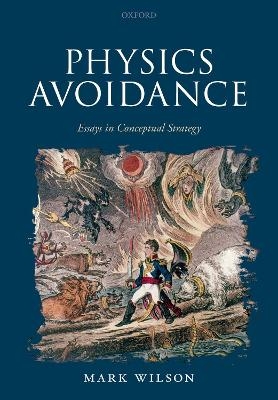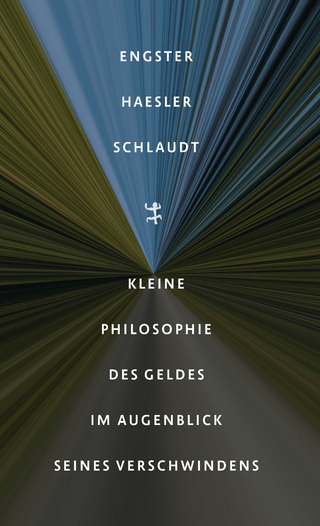
Physics Avoidance
and Other Essays in Conceptual Strategy
Seiten
2021
Oxford University Press (Verlag)
978-0-19-284935-9 (ISBN)
Oxford University Press (Verlag)
978-0-19-284935-9 (ISBN)
Mark Wilson explores our strategies for understanding the world. We frequently cannot reason about nature in the straightforward manner we anticipate, but must use alternative thought processes that reach useful answers in opaque and roundabout ways; and philosophy must find better descriptive tools to reflect this.
Mark Wilson presents a series of explorations of our strategies for understanding the world. 'Physics avoidance' refers to the fact that we frequently cannot reason about nature in the straightforward manner we anticipate, but must seek alternative policies that allow us to address the questions we want answered in a tractable way. Within both science and everyday life, we find ourselves relying upon thought processes that reach useful answers in opaque and roundabout manners. Conceptual innovators are often puzzled by the techniques they develop, when they stumble across reasoning patterns that are easy to implement but difficult to justify. But simple techniques frequently rest upon complex foundations--a young magician learns how to execute a card-guessing trick without understanding how its progressive steps squeeze in on a proper answer. As we collectively improve our inferential skills in this gradually evolving manner, we often wander into unfamiliar explanatory landscapes in which simple words encode physical information in complex and unanticipated ways. Like our juvenile conjurer, we fail to recognize the true strategic rationales underlying our achievements and may turn instead to preposterous rationalizations for our policies. We have learned how to reach better conclusions in a more fruitful way, but we remain baffled by our own successes.
At its best, philosophical reflection illuminates the natural developmental processes that generate these confusions and explicates their complexities. But current thinking within philosophy of science and language works to opposite effect by relying upon simplistic conceptions of 'cause', 'law of nature', 'possibility', and 'reference' that ignore the strategic complexities in which these concepts become entangled within real-life usage. To avoid these distortions, better descriptive tools are wanted. The nine new essays within this volume illustrate this need for finer discriminations through a range of revealing cases, of both historical and contemporary significance.
Mark Wilson presents a series of explorations of our strategies for understanding the world. 'Physics avoidance' refers to the fact that we frequently cannot reason about nature in the straightforward manner we anticipate, but must seek alternative policies that allow us to address the questions we want answered in a tractable way. Within both science and everyday life, we find ourselves relying upon thought processes that reach useful answers in opaque and roundabout manners. Conceptual innovators are often puzzled by the techniques they develop, when they stumble across reasoning patterns that are easy to implement but difficult to justify. But simple techniques frequently rest upon complex foundations--a young magician learns how to execute a card-guessing trick without understanding how its progressive steps squeeze in on a proper answer. As we collectively improve our inferential skills in this gradually evolving manner, we often wander into unfamiliar explanatory landscapes in which simple words encode physical information in complex and unanticipated ways. Like our juvenile conjurer, we fail to recognize the true strategic rationales underlying our achievements and may turn instead to preposterous rationalizations for our policies. We have learned how to reach better conclusions in a more fruitful way, but we remain baffled by our own successes.
At its best, philosophical reflection illuminates the natural developmental processes that generate these confusions and explicates their complexities. But current thinking within philosophy of science and language works to opposite effect by relying upon simplistic conceptions of 'cause', 'law of nature', 'possibility', and 'reference' that ignore the strategic complexities in which these concepts become entangled within real-life usage. To avoid these distortions, better descriptive tools are wanted. The nine new essays within this volume illustrate this need for finer discriminations through a range of revealing cases, of both historical and contemporary significance.
Mark Wilson is Distinguished Professor of Philosophy at the University of Pittsburgh and the author of Wandering Significance (OUP 2006). He has written widely on the relationships that bind together science, language and mathematics. He formerly edited the North American Traditions Series for Rounder records.
1: Pragmatics' Place at the Table
2: Physics Avoidance
3: From the Bending of Beams to the Problem of Free Will
4: Two Cheers for Anti-Atomism
5: The Greediness of Scales
6: Believers in the Land of Glory
7: Is There Life in Possible Worlds?
8: Semantic Mimicry
9: A Second Pilgrim's Progress
| Erscheinungsdatum | 01.11.2021 |
|---|---|
| Verlagsort | Oxford |
| Sprache | englisch |
| Maße | 171 x 246 mm |
| Gewicht | 850 g |
| Themenwelt | Geisteswissenschaften ► Philosophie ► Metaphysik / Ontologie |
| Naturwissenschaften | |
| ISBN-10 | 0-19-284935-2 / 0192849352 |
| ISBN-13 | 978-0-19-284935-9 / 9780192849359 |
| Zustand | Neuware |
| Haben Sie eine Frage zum Produkt? |
Mehr entdecken
aus dem Bereich
aus dem Bereich
Buch | Hardcover (2024)
Matthes & Seitz (Verlag)
28,00 €
Über konstruktivistisches Denken in der Theologie
Buch | Softcover (2024)
Verlag Herder
58,00 €


